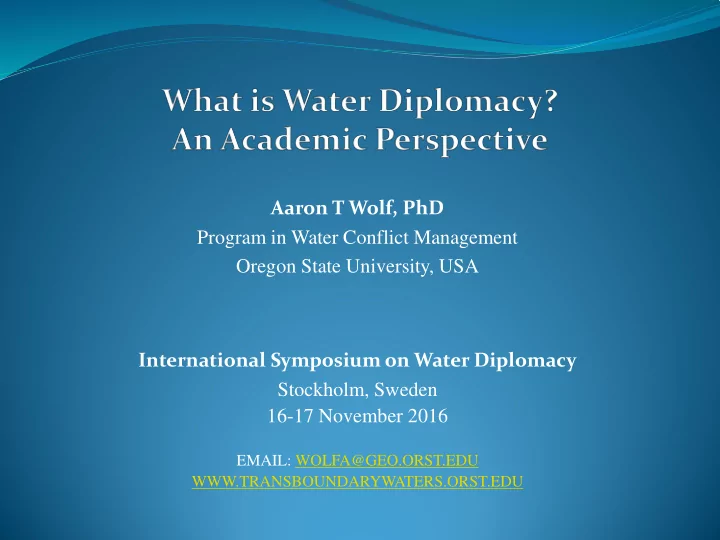

Aaron T Wolf, PhD Program in Water Conflict Management Oregon State University, USA International Symposium on Water Diplomacy Stockholm, Sweden 16-17 November 2016 EMAIL: WOLFA@GEO.ORST.EDU WWW.TRANSBOUNDARYWATERS.ORST.EDU
Aaron T Wolf, PhD Program in Water Conflict Management Oregon State University, USA International Symposium on Water Diplomacy Stockholm, Sweden 16-17 November 2016 EMAIL: WOLFA@GEO.ORST.EDU WWW.TRANSBOUNDARYWATERS.ORST.EDU
Aaron T Wolf, PhD Program in Water Conflict Management Oregon State University, USA International Symposium on Water Diplomacy Stockholm, Sweden 16-17 November 2016 EMAIL: WOLFA@GEO.ORST.EDU WWW.TRANSBOUNDARYWATERS.ORST.EDU
Oregon State University Program in Water Conflict Management and Transformation Transboundary Universities Partnership Professional/Graduate Freshwater Dispute for Transboundary Certificate Program Database (TFDD) Waters • Promotes a global A state-of-the-art GIS Certificate water governance collection of international • Skill-building training culture river basins Practicum and real-world • • Facilitates Online databases problem solving documenting “customized” solutions transboundary water Collaborative Facilitations and • Enhance cooperation Mediations treaties & events among stakeholders. • Skills-building workshops Can be used to better • 17 partners on five to promote cooperation understand water-related continents. between stakeholders conflict and cooperation
Framework for Analysis Benefits, Risks, and Opportunities Political Opportunity Countries likely to consider Countries most likely a deal; benefit expansion to make a deal would improve likelihood Economic Economic Cost Benefit Countries likely to consider a Countries may pursue deal; risk reduction and unilateral development given opportunity enhancement high risks and high costs would improve likelihood Political Risk Source: Subramanian, Brown & Wolf 2013
Framework for Analysis Benefits, Risks, and Opportunities Political Opportunity Countries likely to consider Countries most likely a deal; benefit expansion to make a deal would improve likelihood Economic Economic Cost Benefit Countries likely to consider a Countries may pursue deal; risk reduction and unilateral development given opportunity enhancement high risks and high costs would improve likelihood WATER Political Risk DIPLOMACY Source: Subramanian, Brown & W
What have academics learned (while everyone else was doing all the work…)? 1. More cooperation than conflict; water as entry way to dialogue 682 700 600 500 420 400 334 276 300 242 227 164 200 122 68 100 0 21 17 6 7 0 0 -7 -6 -5 -4 -3 -2 -1 0 1 2 3 4 5 6 7 Increasing Conflict
London School (Zeitoun, Mirumachi, et al.): 2. Relationships are more complicated than events -> water interactions 3. Not all conflict is bad, not all cooperation is good 4. Agreements can solidify power imbalances: “hydro-hegemony”
Politics is the art of the possible, or Everything you thought you knew is wrong: • Hydro-hegemony ? -> Counter-hegemony (Petersen-Perlman) • Polluter pays? ->Whoever has $$ pays • Transparency? -> “creative ambiguity” RBO? Not necessarily • • Basin-wide agreement? Ditto You do what works, now
Lesson 1: Hydro-politics is about hydro AND politics… and all politics is local (or, countries don’t make decisions, people do)
Hydromet (1961), entirely technical, eventually led to: Undugu (1983), and, Tecconile (1993) – annual academic meeting, and finally to: Nile Basin Initiative 12
13
Lesson 2: If you get stuck on a problem, make it bigger…
Dams and Hydroelectric Schemes Source: UNEP/DEWA/GRID-Europe 2006 21
Regional Power Development Strategy Source: NBI RPTP 2011 22
Lesson 3: If you get stuck on a problem, make it bigger… ...or smaller
24
Manage through Existing Institutions? 25
Negotiated Basin Development Space Environmental Sensitivity Rankings (Reflecting Interest and Values)
Negotiated Basin Development Space Development Pressure Rankings (Reflecting Interest and Values) Green Least Impact Orange More Impact Red Most Impact
Lesson 4: Secrecy is dead…
LESSON 5: Don’t forget the spirit – and fun! – of water
Water is sexy!!
Balance in Conflict Ar-Rahman/ Al-Hakam/ Son Father Mercy/Other Justice/Self Anger/ The Other Side Ar-Rahim / Holy Spirit Compassion Universal?
Yin Yang
Sulha: Reconciliation • From musalaha , reconciliation: hostilities ended, honor re- established, and peace restored in the community. • Two basic elements: rights and honor. • Tarrahdhin : “ Resolution of a conflict that involves no humiliation. ”
Kampung Spirit: Singapore Kindness Movement • Spirit of neighborliness of village life • Being revived for vertical living • Community Mediation Centre – 70% of cases resolved • Community Disputes Resolution Tribunals , since Oct. 2015
NEW ZEALAND NATIONAL POLICY STATEMENT for Freshwater Management 2014 “Addressing ta̅ ngata whenua values and interests across all of the well-beings, and including the involvement of iwi and hapu ̄ in the overall management of fresh water, are key to meeting obligations under the Treaty of Waitangi (1840).” All things in the natural world have mauri (life force) and wairua (a spiritual dimension). Respect for the spiritual integrity of the environment and the atua (God) that created it will ensure that the taonga (treasure) can be protected and passed on to succeeding generations.
Thank you!
Recommend
More recommend